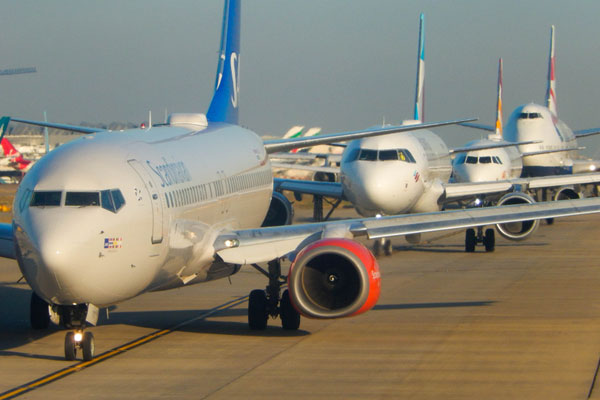A new survey casts doubt on aviation’s claim as an economic catalyst, revealing widespread public scepticism.
Conducted across six major European markets, it shows many believe economic progress does not depend on increased air travel.
Public Sentiment on Aviation’s Economic Impact
A comprehensive pan-European survey reveals a prevailing scepticism among Europeans regarding the aviation industry’s assertion that increased air travel is a driver for economic growth. The survey, which encompassed over 12,000 adults across six significant aviation markets including the UK, illustrated that a substantial 59% of recent flyers and 68% of non-flyers believe economic growth is achievable without an increase in air travel. This sentiment challenges the traditional perspective held by the aviation sector about its economic significance.
Diverging Views in the UK
Within the United Kingdom, the survey results highlighted a divided opinion on the necessity of aviation for economic development. Specifically, 58% of the surveyed population expressed confidence that economic growth can proceed without aviation expansion. In contrast, 30% of participants maintained that air travel remains vital to the economy. Such contrasting views underscore the evolving public perception of aviation’s role in economic progress.
Researchers from the polling group More in Common noted that aviation growth is not widely perceived as essential for economic growth, with a notable inclination for respondents to suggest economic expansion is feasible without increased air travel.
The Role of Climate Concerns
A key finding of the survey was the prioritisation of climate change over economic growth, as evidenced by slight majorities in each country surveyed, including 52% in the UK. Such findings point towards a growing public consensus that environmental issues should take precedence over aggressive economic pursuits.
Additionally, the survey found that significant percentages of the population, including 37% in the UK and 39% in Spain, are more inclined to believe that a fulfilling life necessitates travel. However, a large majority across all age groups refuted the idea that flying is indispensable for holidays, indicating a shift in travel preferences.
Interestingly, younger adults showed a stronger tendency to associate real holidays with flying, yet an overall examination revealed that 55% of both 18-24 and 25-40 age groups reject the notion of flying as essential for holidays. This generational insight suggests evolving travel aspirations.
Support for Rail over Air Travel
The survey results suggest an overwhelming preference for enhancing rail travel as a viable substitute for flights. There is strong public backing for government initiatives to make train journeys cheaper than or equally priced as flights, even if this leads to an increase in airfare costs.
Three-quarters of respondents expressed a desire for train journeys to be the more economical option compared to flights on the same routes. Additionally, 73% advocated for governmental intervention to ensure rail travel remains affordable, with 64% supporting such measures even at the expense of higher flight costs. This reflects a substantial shift towards sustainable travel options.
The research concluded that while most participants display a preference for train travel, its perceived high costs remain a significant barrier. Consequently, there is substantial advocacy for policy shifts to alleviate these financial impediments.
Generational Insights on Travel Preferences
The survey identified notable generational divides in travel preferences, with younger adults more likely to associate meaningful vacations with flying. Simultaneously, the majority of older generations leaned towards non-flight travel options.
This generational difference highlights changing views towards travel, where older adults increasingly value sustainable and cost-effective options over traditional air travel.
Furthermore, such insights indicate a broader trend where environmental awareness is influencing travel choices, particularly among older demographics who may have a heightened sensitivity to ecological impacts.
Implications for the Aviation Industry
The findings present a potential challenge for the aviation industry, which traditionally positions itself as a cornerstone of economic growth. With mounting public support for sustainable travel alternatives, the sector may need to reassess its strategies.
There is a clear indication that public priorities are shifting, with environmental considerations gaining prominence over the perceived economic benefits of increased air travel. This shift could drive industry stakeholders to innovate and align with evolving consumer expectations.
Conclusion on Aviation’s Economic Argument
The survey results mark a significant turn in public opinion regarding aviation’s role in economic growth. While the industry has long championed its contribution to the economy, the data suggests a notable departure from this view among the European populace.
As environmental concerns continue to climb the public and political agenda, the aviation industry may face increasing pressure to innovate and adopt greener practices.
The data highlights a shift in public perception of aviation’s economic contribution.
As environmental issues gain importance, the industry may need to innovate for future success.

